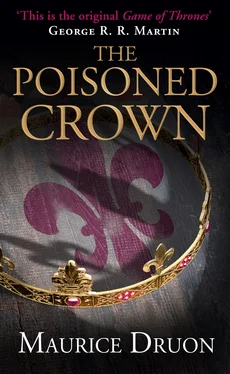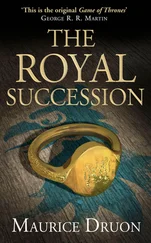Clémence had uttered no single word of regret when she was told that her chests of dresses and jewels had gone overboard.
‘I would have given twice as much,’ she merely said, ‘if it could have saved the poor sailors from being injured by the mast.’
She was less afraid of the storm than of the augury she saw in it.
This marriage was more than I deserved,’ she thought; ‘I have been too happy in the thought of it and have sinned from pride; God will shipwreck me because I do not deserve to become a queen.’
Upon the third morning, when the ship was in a temporary lull, though the sea gave no sign of abating nor the sun of appearing, fat Bouville, his feet bare, dishevelled, wearing only a shirt, was discovered kneeling on the deck with his arms crossed.
‘What on earth are you doing there, Messire?’ asked Princess Clémence.
‘I’m doing what Monsieur Saint Louis did, Madam, when he was nearly drowned off Cyprus. He promised to give a silver ship weighing five marcs 3to Monsieur Saint Nicolas de Warangeville, if God would bring him safely back to France. It was Messire de Joinville who told me the story.’
‘I join you in your vow, Bouville,’ replied Clémence, ‘and since our ship is under the protection of Saint John the Baptist, I promise, if we survive and I am mercifully permitted to give the King of France a son, to call him John.’
She at once knelt down and began praying.
Towards midday the violence of the sea began to decline and everyone became more hopeful. Then the sun burst through the clouds; land was sighted. The captain joyfully recognized the coast of Provence and, as they drew nearer, the calanques of Cassis. He was extremely proud of having kept to his course.
‘You will land us here upon the coast at once, I presume, Master Mariner,’ cried Bouville.
‘I must take you to Marseilles, Messire,’ replied the captain, ‘and we are not far from it. In any case I no longer have sufficient anchors to lie off those cliffs.’
A little before evening the San Giovanni , under oars, was lying off the port of Marseilles. A boat was sent off to warn the city authorities to lower the heavy chain which protected the entrance to the harbour between the Malbert tower and Fort Saint-Nicolas. The Governor, the sheriff, and magistrates (Marseilles was at that time an Angevin city) came off in a strong mistral to welcome the niece of their suzerain lord, the King of Naples.
Upon the quay labourers from the salt-pans, fishermen, makers of oars and rigging, caulkers, money-changers, merchants from the ghetto, clerks from the Genoese and Siennese banks, gaped in astonishment at the huge ship, now a sail-less, dismasted wreck, as the sailors danced and embraced each other on the deck, crying that a miracle had occurred.
The Neapolitan gentlemen and the ladies of the suite endeavoured to put some order in their dress.
Brave Bouville, who had lost a stone during the voyage and whose clothes now hung loose upon him, continually assured those about him that it had been his idea to make a vow and that it was this which had prevented their being shipwrecked, that everyone, in fact, owed their life to him.
‘Messire Hugues,’ Guccio replied with an ironic gleam in his eye, ‘there never has been a storm, from what I hear, in which someone has not made a vow similar to yours. How then do you explain the fact that so many ships manage to go to the bottom all the same?’
‘It must be because they have a miscreant like you on board!’ replied the ex-Chamberlain with a smile.
Guccio was the first to jump ashore. He leaped lightly from the shrouds in order to prove how vigorous he was. There was a rending cry. After several days upon a pitching deck, Guccio had miscalculated the earth’s stability; his foot had slipped and he had fallen into the sea. He barely escaped being crushed between the stone quay and the ship’s hull. The sea around him at once turned red; in his fall he had torn himself on an iron hook. He was pulled out in a half-fainting condition, bleeding, his thigh cut to the bone. He was immediately taken to the Hôtel-Dieu.
3 3. The Hôtel-Dieu 4. Portents of Disaster 5. The King Receives the Oriflamme 6. The Muddy Army 7. The Philtre 8. A Country Wedding Part Two: After Flanders, Artois 1. The Insurgents 2. The Countess of Poitiers 3. The Second Couple in the Kingdom 4. A Servant’s Friendship 5. The Fork and the Prie-dieu 6. Arbitration Part Three: The Time of the Comet 1. The New Master of Neauphle 2. Dame Eliabel’s Reception 3. The Midnight Marriage 4. The Comet 5. The Cardinal’s Spell 6. ‘I Assume Control of Artois’ 7. In the King’s Absence 8. The Monk is Dead 9. Mourning Comes to Vincennes 10. Tolomei Prays for the King 11. Who is to be Regent? Footnotes Historical Notes Author’s Acknowledgements By Maurice Druon Copyright About the Publisher
The Hôtel-Dieu 3. The Hôtel-Dieu 4. Portents of Disaster 5. The King Receives the Oriflamme 6. The Muddy Army 7. The Philtre 8. A Country Wedding Part Two: After Flanders, Artois 1. The Insurgents 2. The Countess of Poitiers 3. The Second Couple in the Kingdom 4. A Servant’s Friendship 5. The Fork and the Prie-dieu 6. Arbitration Part Three: The Time of the Comet 1. The New Master of Neauphle 2. Dame Eliabel’s Reception 3. The Midnight Marriage 4. The Comet 5. The Cardinal’s Spell 6. ‘I Assume Control of Artois’ 7. In the King’s Absence 8. The Monk is Dead 9. Mourning Comes to Vincennes 10. Tolomei Prays for the King 11. Who is to be Regent? Footnotes Historical Notes Author’s Acknowledgements By Maurice Druon Copyright About the Publisher

THE HUGE WARD FOR men was like a cathedral nave. At the end of it was an altar where four masses, vespers, and evensong were celebrated every day. The privileged patients occupied little cells, called ‘rooms of consideration’, which lined the walls; the rest were lying two in a bed and head to foot. The monks, in long brown habits, were continuously passing up and down the centre aisle, either to sing the office, to attend to the sick or serve the meals. Religious exercises were intimately related to medical treatment; the groans of the sufferers were mingled with verses of the psalms; the odour of incense could not overcome the atrocious smell of fever and gangrene; death was a public spectacle. Inscriptions, painted in high gothic letters upon the walls, prepared the patient for death rather than recovery. 4
For three weeks Guccio had lain there in a cell, gasping for breath in the appalling heat of summer, which always has a tendency to make illness more exhausting and hospitals more disagreeable. He looked sadly at the rays of the sun which entered by the windows pierced high in the wall and threw large golden patches upon this assembly of human desolation. He could make no movement without groaning; the balms and elixirs of the nursing brothers burnt him like so many flames, and every dressing was a time of torture. No one seemed to be able to tell him whether the bone was affected; but he felt sure that the wound was more than a flesh-wound, since he nearly fainted whenever they touched his thigh or the small of his back. The doctors and surgeons assured him that he was in no mortal danger, that at his age one recovered from anything, and that God had performed many another miracle, as He had for that caulker’s boy who had come in the other day, carrying his intestines in his hands, and who had left after a short time even gayer than before. Guccio despaired none the less. He had been there three weeks already and there seemed no reason to suppose he would not be there for another three, or even three months, or that he would not be lame and crippled for ever.
Читать дальше













